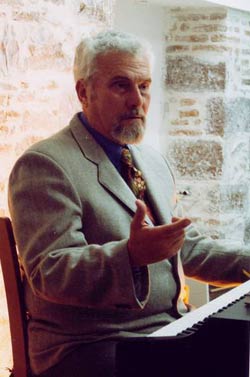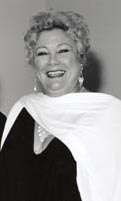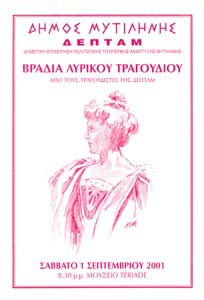
|
"High Art" and the Populace
By Antony Karvelas |
1. having served as President of the Manolis Kalomiris Society 2. establishing here in Mytilene an amateur Opera Troupe which in its present phase by decision of the Mayor Aris Hatzikomnimos constitutes the Opera Studio Deptam directed by my wife Ioanna Sfekas Karvelas, and 3. forming a few years ago a chorus in the village of Vatoussa in Lesvos on behalf of the Christos and Mary Papoutsy Foundation for the Revitalization of Vatoussa. My wife, a dramatic soprano with an international career, whenever she had to prepare a new role, always used to arrange for us to vacation in Vatoussa so that she could practice in the spacious living room of my family home in that village, a traditional stone house over one and a half centuries old. We were impressed that our fellow villagers, instead of being disturbed by the whole process of study of an operatic voice, as clearly were our neighbors in Athens and various other cities of the world, on the contrary, exhibited an intense interest in the goings on, whether they entailed dry vocal exercises or various scenes and arias from the classical operatic repertoire which my wife happened to be studying at the time. Usually they would gather outside our house in order to listen, and then they would applaud and scream "bravo!" Often they
At that point my wife began to present concerts in the village with arias, classical songs and songs by Classical Greek composers inspired by our folk music. The reactions of the villagers was so intense and enthusiastic that when Christos and Mary Papoutsy decided to form the Papoutsy Foundation, we felt urged to suggest to them that they establish choruses for the local adults and children. My wife and I solicited door to door and collected the impressive number of 47 chorus members out of the 300 or so inhabitants of the village! The enthusiasm of these young people as they took voice lessons from my wife is indescribable. After these choral groups had been organized, we left them with a music teacher that my wife suggested and settled down to live in the city of Mytilene. Here, for the last three years, as most of you probably know, our original opera group which developed into the Opera Studio Deptam, has enjoyed a markedly increased success. Both in the large space of the Geni Tzami Mosque and in the open air courtyard of the Teriade Museum, where we gave our two most recent concerts for this year's Lesvos Summer Festival, there was standing room only! The Lesvos public flocked to hear its young local talents. The significant discovery for us through these experiences is that the receptivity of the populace to "high art" is much greater than one would expect. Here we have a situation in which the audience is being initiated into this type of music by its own children, grandchildren, nieces,
All this has caused me to muse on some facts which are common knowledge to us all. . . .In Ancient Greek times nearly the sum total of the population followed the dramas of the Ancient Greek tragedians Aeschylus, Sophocles, and Euripides. In the time of Shakespeare, viewers from all social classes amassed into the Stratford-on-Avon Theatre. In the 19th century Guiseppe Verdi roused his audiences to patriotic passion with his operas of the Risorgimento period when the various states of Italy were under the yoke of the Austrians. During the whole of the 19th and 20th centuries and up to today, the audiences of opera round the world have comprised all social classes. The audience of the upper gallery, where the tickets are cheaper and many must stand up throughout the performance, has always been considered the main critic of the level of a performance and is known for its vociferous accolades or censures. In the days of the Soviet Union, promulgation of every type of classical music and especially opera was such that free tickets distributed to the factory organizations thereby enabling the entire work force of the country to attend the performances. In Greece today, in spite of the great amount of "cultural" garbage which the private television stations dish out which is naturally mimicked by a significant portion of our population, there seems to be developing a new spirit of the times or "Zeitgeist" which tends to unite us with the culture of the rest of the western world, which did not remain, as we did, under Turkish occupation for over four centuries. After all, western culture in all its historical developments is a legacy bequeathed to mankind, via the Renaissance, by the culture of the Ancient Greeks. Antony Karvelas is a retired lawyer and judge who now lives in Mytilene with his wife, Ioanna Sfekas Karvelas, a dramatic soprano vocalist. This article originally appeared in "The Democrat of Mytilene" on 29 Dec 2003 in Greek. Ms. Karvelas has graciously offered to HCS readers an English translation of the original article. Publishers' Comments: We can vouch for the enthusiastic Vatoussan response to Ms. Karvelas' vocal exercises and performances. When we first visited Vatoussa, the villagers very proudly pointed out that the village was home to a famous opera singer. And what's more, the author's main point is likewise an accurate observation. Appreciation for "high" or fine arts is not limited to Vatoussa or Mytilene as he suggests. We have attended a number of summertime, open-air dramatic performances of Ancient tragedies in Greece: each time we noted that the stadium was filled with people of every age group and background, with a great many children listening as raptly and attentively as their parents. "Vita brevis est, ars longa." |
|



